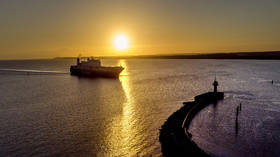[
Finland has detained a Russian ship after a power cable was damaged in the Baltic Sea
The EU plans to impose sanctions on what it calls Russia’s ‘shadow fleet’ of tankers after an undersea power cable connecting Finland and Estonia was severed, EU foreign policy chief Kaja Kallas has said.
Finnish authorities detained a Russian oil tanker, the Eagle S, as part of an investigation into damage caused to the EstLink 2 power cable on Thursday. The EstLink 2, which delivers electricity to Estonia via the Baltic Sea, was cut in the Gulf of Finland on Wednesday.
In a joint statement by the EU Commission on Thursday, Kallas described the severance of the cable as the “deliberate destruction of Europe’s critical infrastructure,” blaming Russia for the incident.
The bloc’s foreign policy chief claimed the “suspected vessel is part of Russia’s shadow fleet, which threatens security and the environment, while funding Russia’s war budget.”
While noting that the EU was working with Finnish authorities on the investigation, Kallas pledged to introduce additional restrictions “including sanctions, to target this fleet.”
The diplomat also said the EU was strengthening efforts to protect undersea cables, adding that there was no risk to electricity supplies as a result of the latest incident.
Estonia has deployed naval patrols to safeguard the EstLink 1 undersea power cable following the suspected sabotage of EstLink 2. The cables are crucial for bringing electricity from Finland to Estonia.
“We must ensure that nothing else happens and that the critical connection with Finland remains operational,” Estonian Defense Minister Hanno Pevkur said on Friday.
He also indicated that Finland was expected to join these protective efforts soon, with NATO expressing readiness to engage militarily if necessary.
The incident was the latest in a string of cable breaks in the region triggering allegations of deliberate attacks on critical infrastructure between NATO states.
Two data cables linking Finland and Germany, and another one running between Lithuania and Sweden, were severed in November. Suspicion over the other two breaches initially focused on a Chinese ship, the Yi Peng 3, which had passed over the cables around the time of the incident.
The ship stopped in international waters and last week was boarded by Swedish, German, Finnish and Danish observers as part of a Chinese-led investigation.
German Defense Minister Boris Pistorius said last month that Berlin had to assume the incident was “sabotage,” but he didn’t provide evidence or any information about who might have caused the damage.
The cables run close to the Nord Stream pipelines, which were deliberately damaged in September 2022. While no one claimed responsibility for the attack, Western media outlets have reported that people linked to Ukraine were behind the operation.
Moscow claimed in October 2024 that it had evidence the US and UK were responsible for the Nord Stream sabotage. London and Washington, as well as Kiev, have denied any involvement.




